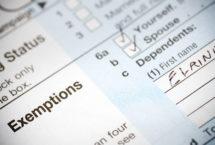Even seasoned homeowners might shudder a little when their property tax bill arrives, but there are steps you can take to make sure you don’t pay more than necessary. All it takes is a little sleuthing and taking advantage of the laws designed specifically to save you, and other homeowners, money on property taxes.
Examine Your Exemptions
One of the first strategies for cutting your property taxes should be to check with your tax assessor’s office for any exemptions for which you might qualify. One of the more common ways to save money is the homestead exemption, which is provided in many states to give homeowners some tax relief. Homestead exemptions usually protect a portion of your home’s value from taxes. The exempt portion might be figured on a fixed amount of the property’s value, or it might be calculated as a percentage of the total property value. Check with your tax assessor’s office to see if you qualify and request the application.
Other exemptions could include those for disabled veterans and other disabled people, senior citizens, school taxes and more. Check with your local tax assessor’s office or county website for all of the exemptions available.
Analyze Your Statement for Errors
Property taxes are based on the assessed value of your property, which means each piece of property in the county must be evaluated before the tax rate can be applied. Assessing and collecting taxes is a big job, and mistakes are bound to happen. County assessor offices might be understaffed and overworked, and even the simplest errors made by a clerk can increase your tax bill.
Review your statement each year when arrives. Check every detail, including your home’s listed square footage, number of baths, improvements, outbuildings – anything that could affect your home’s assessed value. If you spot an error, contact your tax assessor and ask about the procedure for getting it corrected. Even a small error can make a noticeable difference in your taxes.
Be a Nosey Neighbor
This is a case where keeping up with the Joneses, or neighbors with any other surname, is not a bad idea. In fact, it’s a good idea and could reduce your property taxes. Look on your county’s website or other specialty real estate websites (Zillow.com is an example), which collect publicly available real estate and local tax records. You can use this information to compare the assessed values and appraisals of similar properties in your geographic area with those of your own property. If you’re friendly with your neighbors, all the better; you can simply ask them. You can also ask a real estate agent for an appraisal.
If, upon your investigation, you find that similar properties in your neighborhood are assessed substantially below your property’s assessed value, this should raise some questions. Call your tax assessor’s office and ask for an explanation; they might have a perfectly reasonable response. If not, consider filing an appeal.
Appeal For a Better Deal
If you think your property has been assessed too high, you have the option to file an appeal with the tax assessor’s office. You have a defined period of time after you receive your tax statement to file your appeal, so start early and be prepared to provide the supporting evidence.
The first step is to learn as much as possible about your local property tax laws. Talk to your local tax assessor, ask questions and state your case. Simple errors, as stated above, might be fixed immediately, but getting your home’s assessed value lowered could require a formal appeal.
If an appeal is required, ask about the process and any fees. An appeal that is complex or involves a significant amount of money may warrant a tax attorney’s advice. Once your claim is filed, you will have to wait for a response. If denied, the process can be carried further, and may include a hearing. At that point, you may wish to enlist professional advice. If your appeal is accepted, your home’s assessed value may be reduced which should lower your property tax bill.
Stay Vigilant
Even if you don’t find any errors or additional exemptions this year, make sure you stay vigilant in the years ahead. Ask your neighbors to check their tax statements, too. By working together, you can help ensure that property taxes where you live are accurate and fair for everyone.





